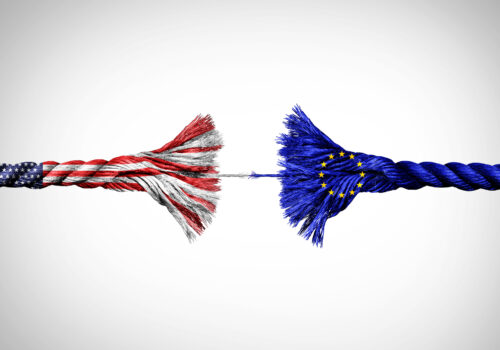Why European businesses are now stuck in the middle of an EU-China storm
“Our market in China has literally collapsed,” Porsche Chief Executive Officer Oliver Blume told shareholders in May this year. Porsche is not alone. Across the European Union (EU), companies are grappling with the consequences of escalating trade tensions between the EU and China.
Next week, these companies will be watching closely as European Commission President Ursula von der Leyen visits Beijing to mark the fiftieth anniversary of EU-China diplomatic and economic relations. While a golden jubilee is typically a cause for celebration, tensions between the two sides remain high. In April, China restricted exports of rare-earth materials—roughly 98 percent of the EU’s imports come from China—significantly affecting the bloc’s defense and automotive sectors. Then, at the Group of Seven (G7) Summit in June, von der Leyen accused Beijing of exhibiting a “pattern of dominance, dependency, and blackmail,” prompting a sharp rebuke from Chinese officials, one which criticized the wider G7 for having a “Cold-War mentality.” Later that month, the EU canceled the High-Level Economic and Trade Dialogue with China, citing a lack of progress on key trade disputes. This meeting would ordinarily set the stage for the upcoming leaders’ summit.
The summit, originally planned as a two-day event, has now been scaled down to a single day (July 24) in Beijing. On that day, it is expected that von der Leyen and European Council President António Costa will meet with President Xi Jinping, despite earlier assessments that the Chinese leader was unlikely to participate. The second day of the summit, during which the EU leaders were expected to participate in business discussions, has been canceled at Beijing’s request.
The private sector dilemma
Analysis on these issues often focuses on Chinese exports and overlooks the demand side driven by the world’s second-largest economy. China is the EU’s third-largest export destination, with EU exports to China increasing more than sevenfold since the early 2000s. Today, 87 percent of EU exports to China are manufactured goods, including machinery, automobiles, chemicals, and electronics.
The chart below highlights continental European companies with the highest exposure to the Chinese market, segmented by industry. Collectively, these companies generated nearly $160 billion in revenue from China in 2024, roughly the size of Kuwait’s economy.
The industry with the most companies that are among the firms most exposed to China is machinery. These firms focus on areas spanning pumps and valves (VAT Group, Sulzer, Alfa Laval), elevators (Schindler), mining equipment (Atlas Copco), and transport systems (Knorr-Bremse). While not consumer-facing, these firms are deeply embedded in China’s industrial supply chains. Their reliance on long-term contracts and infrastructure demand makes them especially vulnerable to policy shifts or retaliation.
Even more striking is the semiconductor sector, where companies such as ASML (36 percent), Infineon (34 percent), and BESI (34 percent) show some of the highest levels of revenue dependence on China. As providers of critical technologies, particularly in advanced chipmaking equipment, they are increasingly caught between China’s push for tech self-sufficiency and Western efforts to restrict sensitive exports. Any retaliation could ripple across global supply chains and hit Europe’s tech sector hard.
By country, Switzerland—despite not being part of the EU—leads with ten companies among the top thirty most exposed, followed by Germany with nine. The Netherlands also shows significant exposure, largely due to ASML and its specialized lithography systems critical to semiconductor manufacturing. The Dutch firm’s vulnerability was highlighted this week when its chief executive officer, Christophe Fouquet, walked back his 2026 growth forecast, citing trade disputes and geopolitical tensions, causing shares to fall 11 percent.
The EU’s private sector is under mounting pressure from sustained US tariffs, a flood of subsidized Chinese imports into Europe, and the growing threat of Chinese retaliation. Companies are already pushing back. Mercedes-Benz Chief Executive Officer Ola Källenius urged policymakers to find an “equitable solution” that creates a “level playing field in an open market” rather than a barrier. He warned that “what we need now is intelligent solutions, not confrontation.” Across industries, European firms are advocating for approaches that reduce the risk of further escalation.
And Chinese retaliation is not hypothetical. After the EU imposed tariffs on Chinese electric vehicles, Beijing swiftly launched an antidumping investigation into EU pork products and banned European medical devices worth over €45 million. Additionally, in early July, China imposed antidumping duties of 27.7 to 34.9 percent on EU brandy for five years—though major French producers were exempted as part of a negotiated deal.
Amid these mounting tensions, von der Leyen faces a precarious position. The challenge for her is whether she can embrace calls for economic neutrality to preserve crucial business ties and market access—potentially drawing US criticism for appearing soft on China—or maintain her hardline stance and consequently watch European companies bear the cost of potential retaliation.
US President Donald Trump and his team understand these pressure points and are leveraging them in ongoing trade talks with the EU. They are watching closely to see whether the EU receives a warm embrace or a cold shoulder in Beijing.
If von der Leyen opts for confrontation and relations continue to deteriorate, the world’s three major economic engines—the United States, EU, and China—could find themselves in economic conflict. At that point, markets may finally wake up to the true cost of the trade war—and European businesses will be caught squarely in the middle.
Alisha Chhangani is an assistant director at the Atlantic Council’s GeoEconomics Center.
This post was updated on July 21, 2025 to reflect the latest reporting indicating that Xi will attend the EU-China meetings, but European Commission Vice-President Kaja Kallas is not confirmed.
This post is adapted from the GeoEconomics Center’s weekly Guide to the Global Economy newsletter. If you are interested in getting the newsletter, email SBusch@atlanticcouncil.org.

At the intersection of economics, finance, and foreign policy, the GeoEconomics Center is a translation hub with the goal of helping shape a better global economic future.
Further reading
Mon, Jul 14, 2025
Injecting new life into Europe’s life science industry to improve competitiveness
Econographics By Emma Nix
US turmoil under Trump has shaken the life sciences sector, prompting top researchers to consider leaving. Europe now has a rare chance to attract this talent and revive its biotech and pharma industries—but only if it moves quickly and decisively before China does.
Fri, Dec 20, 2024
Decoding French economic statecraft
Issue Brief By Charles Lichfield
Understanding how France “does” economic statecraft will be crucial for US and other Western policymakers in the months and years ahead.
Wed, Apr 30, 2025
US-EU sanctions divergence would spell trouble for multinational companies
Econographics By Jesse Sucher
The fracturing of traditional alliances carries significant consequences for companies facing multijurisdictional compliance obligations, meaning an already complex situation will become more chaotic.
Image: Mercedes-Benz Group AG is a German automotive company.



